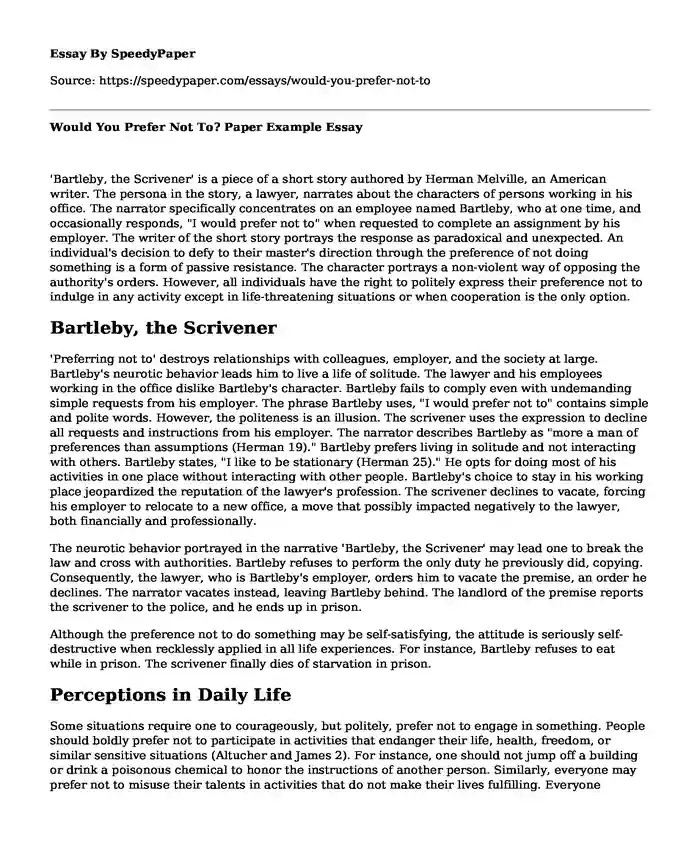
| Type of paper: | Essay |
| Categories: | Human resources Social psychology Business communication American literature |
| Pages: | 4 |
| Wordcount: | 862 words |
'Bartleby, the Scrivener' is a piece of a short story authored by Herman Melville, an American writer. The persona in the story, a lawyer, narrates about the characters of persons working in his office. The narrator specifically concentrates on an employee named Bartleby, who at one time, and occasionally responds, "I would prefer not to" when requested to complete an assignment by his employer. The writer of the short story portrays the response as paradoxical and unexpected. An individual's decision to defy to their master's direction through the preference of not doing something is a form of passive resistance. The character portrays a non-violent way of opposing the authority's orders. However, all individuals have the right to politely express their preference not to indulge in any activity except in life-threatening situations or when cooperation is the only option.
Bartleby, the Scrivener
'Preferring not to' destroys relationships with colleagues, employer, and the society at large. Bartleby's neurotic behavior leads him to live a life of solitude. The lawyer and his employees working in the office dislike Bartleby's character. Bartleby fails to comply even with undemanding simple requests from his employer. The phrase Bartleby uses, "I would prefer not to" contains simple and polite words. However, the politeness is an illusion. The scrivener uses the expression to decline all requests and instructions from his employer. The narrator describes Bartleby as "more a man of preferences than assumptions (Herman 19)." Bartleby prefers living in solitude and not interacting with others. Bartleby states, "I like to be stationary (Herman 25)." He opts for doing most of his activities in one place without interacting with other people. Bartleby's choice to stay in his working place jeopardized the reputation of the lawyer's profession. The scrivener declines to vacate, forcing his employer to relocate to a new office, a move that possibly impacted negatively to the lawyer, both financially and professionally.
The neurotic behavior portrayed in the narrative 'Bartleby, the Scrivener' may lead one to break the law and cross with authorities. Bartleby refuses to perform the only duty he previously did, copying. Consequently, the lawyer, who is Bartleby's employer, orders him to vacate the premise, an order he declines. The narrator vacates instead, leaving Bartleby behind. The landlord of the premise reports the scrivener to the police, and he ends up in prison.
Although the preference not to do something may be self-satisfying, the attitude is seriously self-destructive when recklessly applied in all life experiences. For instance, Bartleby refuses to eat while in prison. The scrivener finally dies of starvation in prison.
Perceptions in Daily Life
Some situations require one to courageously, but politely, prefer not to engage in something. People should boldly prefer not to participate in activities that endanger their life, health, freedom, or similar sensitive situations (Altucher and James 2). For instance, one should not jump off a building or drink a poisonous chemical to honor the instructions of another person. Similarly, everyone may prefer not to misuse their talents in activities that do not make their lives fulfilling. Everyone deserves abundance and appreciation of skills. Sometimes friends, family members, bosses at workplaces, colleagues, or institutions may insist that you attend to their demands to benefit them. In such instances, one is entitled to prefer not to follow their needs to assert personal interests (Altucher and James 4). The decision of what to do or not to do is a personal preference. Thus, the compulsion of people to participate in activities they do not want should be discouraged.
Personal Experience
I have encountered many instances where I am required to decide which action to take. For instance, one of my cousins asked me to do her laundry to allow her to join some friends for a movie. Her reasons why she could not have done her laundry did not convince me to assist. I therefore politely told her that I prefer not to clean her clothes without giving further explanations. She seemed not impressed by my decision not to assist. However, I was certain that the choice of whether to help was personal. Assertive decisions are the best but may hurt some people.
Conclusion
Bartleby had the right to prefer not to engage in activities he disliked but not to an extent risking his life or freedom. In the story 'Bartleby, the Scrivener,' Bartleby preferred not to attend to his duties at work. Although the action did not please his employer and colleagues, he decided whether to work or not. However, the scrivener's decision to stay in the office without permission from the premise owner amounted to his imprisonment. Further, his preference not to take meals led to his death. In my personal experiences and situations, I would not prefer not to act in a certain way if the action's impacts can negatively affect my wellbeing. From my perspective, preference to do or not to do something is a personal decision. However, one should consider the consequences of available choices when making decisions.
Work Cited
Altucher, Claudia, and James Altucher. The Power of No. Hay House, 2014.
Melville, Herman. "Bartleby, The Scrivener: A Story of Wall-Street." Columbia Law School, http://moglen.law.columbia.edu/LCS/bartleby.pdf. Accessed 4 March 2019.
Cite this page
Would You Prefer Not To? Paper Example. (2023, Apr 18). Retrieved from https://speedypaper.com/essays/would-you-prefer-not-to
Request Removal
If you are the original author of this essay and no longer wish to have it published on the SpeedyPaper website, please click below to request its removal:
- What Is the Advantage of the Internet Essay Sample
- Family Law Essay Example
- Free Essay on Importance of Music Education in Schools
- Free Essay on Critical Role of Nursing in Enriching People's Lives
- Cochrane - Article Review Essay Example
- Trust in Football Coaching
- Essay Example about Children with Autism and Mental Illness
Popular categories




